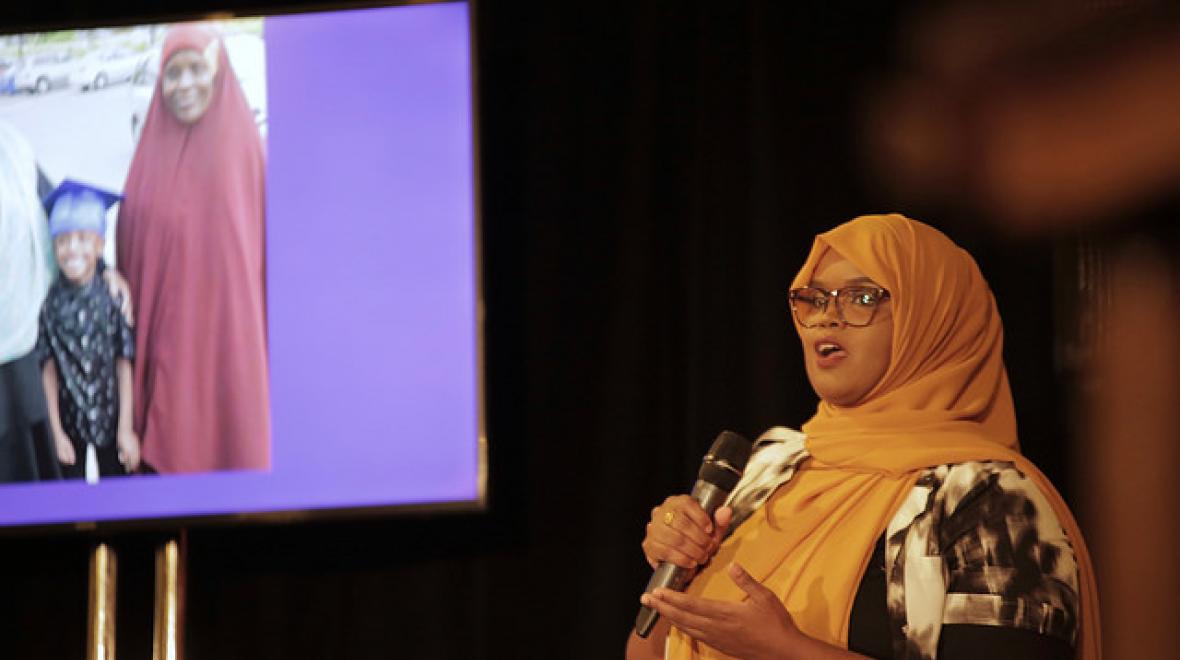
Photo:
Asha Warsame discussed her work with Somali refugees during the March 28 EDU Talks. Photo credit: University of Washington
Here’s your parenting fact for the week: 90 percent of a child’s brain develops by age 5.
Gives a whole new meaning to why early learning matters, right?
Early learning — and how to ensure every child in Washington state gets a strong start in life — took center stage at the University of Washington’s (UW) College of Education’s EDU Talks on March 28.
UW faculty members and the director of education at Seattle Children’s Museum each gave five-minute TED-style talks about their research on early learning education at the event, which was co-hosted by the Seattle Children’s Museum.
Here’s what I learned:
One out of three young learners in Washington state are dual-language learners.
UW assistant professor Soojin Oh Park’s research looks at the critical issues facing dual-language learners, children of immigrants and people of color.
While quality early learning is important for all kids, Park says, research shows the impact is larger for children of immigrants. And yet immigrant parents are less likely to enroll in high quality childcare programs (blame cost, racial discrimination, language barriers and fears related to immigration status).
Park’s goal is to develop real-time, actionable data that builds the infrastructure needed to support dual-language learners. On the list: Her newborn son.
“Three years from now, I hope he won’t only speak English or put away part of himself when he enters a classroom,” she says. "I hope his native language stays strong so he can get to know his grandparents, just like I did.”
It doesn’t cost much to change.
Small, low-cost changes within early learning environments make a significant impact for the youngest learners, according to a series of videos produced by the UW’s Cultivate Learning center.
Like your favorite home renovation show, the Meaningful Makeover series chronicles renovations of early learning spaces. The changes are simple and cheap; one episode shows how just moving a couch allows for more circle time space.
The best part? When they reveal the new room to the kids.
Parent involvement and culturally relevant materials matter.
As a child, Asha Warsame lived as a refugee and knew her mother didn’t have the resources she needed to help her navigate the educational system. Now grown, Warsame wants to change that for other kids.
She works with Somali refugees to help their children maximize their educational experiences. Through her work, she’s watched refugee parents share lessons learned from their own parents with their children.
“Culturally relevant parent education helps parents understand that they are their child’s first teacher,” says Warsame, who is adapting a parent education program for Somali refugees.
Let's hear it for positive dads.
When dads build and nurture responsive relationships with infants and toddlers, they’re also building a foundation for early learning and childhood well-being, says Holly Schindler, an assistant professor at the UW College of Education.
Her research includes a filming participating dads as they interact with their infants. “We show Dad his reel, tell him what he is doing right and explain why the skills he is already doing are so important,” Schindler says. “We’re making dads their own role model and letting [each dad] know that he’s got this.”
Afterwards, dads interacted more positively and more frequently with their children. Parenting stress and child behavior problems also decreased, says Schindler.
Get kids to talk at snack time.
Clumsy conversation and awkward pauses don’t belong at the preschool snack table, according to Ariane Gauvreau, a teaching associate in special education at the UW.
To help teachers foster conversation among young students, Gauvreau created a visual conversation board that showed rows of cartoon pictures depicting items that preschools like to talk about (favorite movie characters, things to do outside, you get the idea).
These “snack talk sheets” encouraged students to talk more to one another. They initiated conversations and responded more often, stayed at the snack table longer and presented fewer challenging behaviors.
Educators need professional development, too.
In Washington state, there are more than 6,000 licensed childcare programs and tens of thousands of caregivers but it isn’t always easy for caregivers to access professional development classes. Let’s change that, says Virginia Tse, an assessment lead at Early Achievers Ratings at the UW's Cultivate Learning.
Tse and her team developed a program that delivered talk-show-like webisodes directly to educators’ phones. Teachers could video tape themselves in class, sending this videos to coaches for feedback.
One participant said she learned a month’s worth of lessons for her toddler classroom in a single lesson. Another shared how the program was the best thing that’s happened to them in 10 years of teaching. Notably: A caregiver with 25-plus years of experience was happy to report she found herself fully capable of learning by smartphone.











